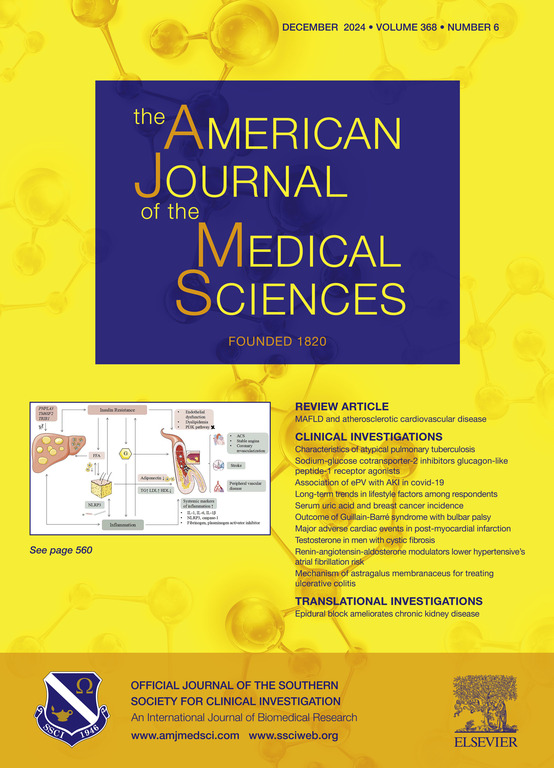Klotho plays a crucial role in the renal-protective effect of allopurinol on renal ischemia-reperfusion injury
IF 2.3
4区 医学
Q2 MEDICINE, GENERAL & INTERNAL
引用次数: 0
Abstract
Background
Allopurinol, a xanthine oxidase inhibitor, recovers histological alterations and renal dysfunction induced during renal ischemic-reperfusion injury. This study investigated the cross-talk between the allopurinol and soluble Klotho.
Methods
Rats were randomly divided into three equal groups (n = 8 per group): The sham-operated group without renal ischemia, the BIR (bilateral ischemia-reperfusion) group which underwent renal ischemia, and BIR+Allo (allopurinol) group which was pretreated with allopurinol (100 mg/kg- gavage) 30 min before the renal ischemia. After recovery from the anesthesia, all animals were placed in metabolic cages to collect their urine after 24 h, plasma was extracted from blood samples taken from the tail vein—plasma and urine samples were saved at -20 °C. Kidneys were harvested and weighed. The left kidney was dropped in the buffer of 10 % formalin for H&E staining, and the right kidney was located in liquid nitrogen and saved at -80 °C for the oxidative stress analysis.
Results
After renal ischemia-reperfusion, serum creatinine, blood urea nitrogen, xanthine oxidase, and total oxidative stress levels significantly increased. However, plasma Klotho level and total antioxidative capacity decreased in the BIR group. There was a reverse correlation between Klotho and xanthine oxidase levels. The pre-treatment with allopurinol increased plasma Klotho, induced a protective effect on renal histopathological changes, and corrected functional biomarkers.
Conclusion
Our results showed that allopurinol enhanced the antioxidative effects by increasing Klotho activity. Therefore, Klotho may be involved in the protective effects of allopurinol on the renal injury induced by BIR.
Klotho在别嘌呤醇对肾缺血再灌注损伤的保护作用中起着至关重要的作用。
背景:别嘌呤醇是一种黄嘌呤氧化酶抑制剂,可恢复肾缺血再灌注损伤引起的组织学改变和肾功能障碍。本文研究了别嘌呤醇与可溶性克罗索之间的串扰。方法:将大鼠随机分为3组,每组8只,分别为假手术无肾缺血组、双侧缺血再灌注组和肾缺血前30 min用别嘌呤醇(100 mg/kg-灌胃)预处理的BIR+Allo(别嘌呤醇)组。麻醉恢复后,将所有动物置于代谢笼中,于24 h内收集尿液。24 h后,取尾静脉血样提取血浆,-20℃保存血浆和尿液。取下肾脏并称重。左肾滴入10%福尔马林缓冲液中进行H&E染色,右肾置于液氮中保存于-80℃进行氧化应激分析。结果:肾缺血再灌注后血清肌酐、尿素氮、黄嘌呤氧化酶、总氧化应激水平显著升高。然而,BIR组血浆Klotho水平和总抗氧化能力下降。Klotho与黄嘌呤氧化酶水平呈负相关。别嘌呤醇预处理增加血浆Klotho,诱导对肾脏组织病理学改变的保护作用,并纠正功能性生物标志物。结论:别嘌呤醇通过提高Klotho活性来增强抗氧化作用。因此,Klotho可能参与了别嘌呤醇对BIR所致肾损伤的保护作用。
本文章由计算机程序翻译,如有差异,请以英文原文为准。
求助全文
约1分钟内获得全文
求助全文
来源期刊
CiteScore
4.40
自引率
0.00%
发文量
303
审稿时长
1.5 months
期刊介绍:
The American Journal of The Medical Sciences (AJMS), founded in 1820, is the 2nd oldest medical journal in the United States. The AJMS is the official journal of the Southern Society for Clinical Investigation (SSCI). The SSCI is dedicated to the advancement of medical research and the exchange of knowledge, information and ideas. Its members are committed to mentoring future generations of medical investigators and promoting careers in academic medicine. The AJMS publishes, on a monthly basis, peer-reviewed articles in the field of internal medicine and its subspecialties, which include:
Original clinical and basic science investigations
Review articles
Online Images in the Medical Sciences
Special Features Include:
Patient-Centered Focused Reviews
History of Medicine
The Science of Medical Education.

 求助内容:
求助内容: 应助结果提醒方式:
应助结果提醒方式:


